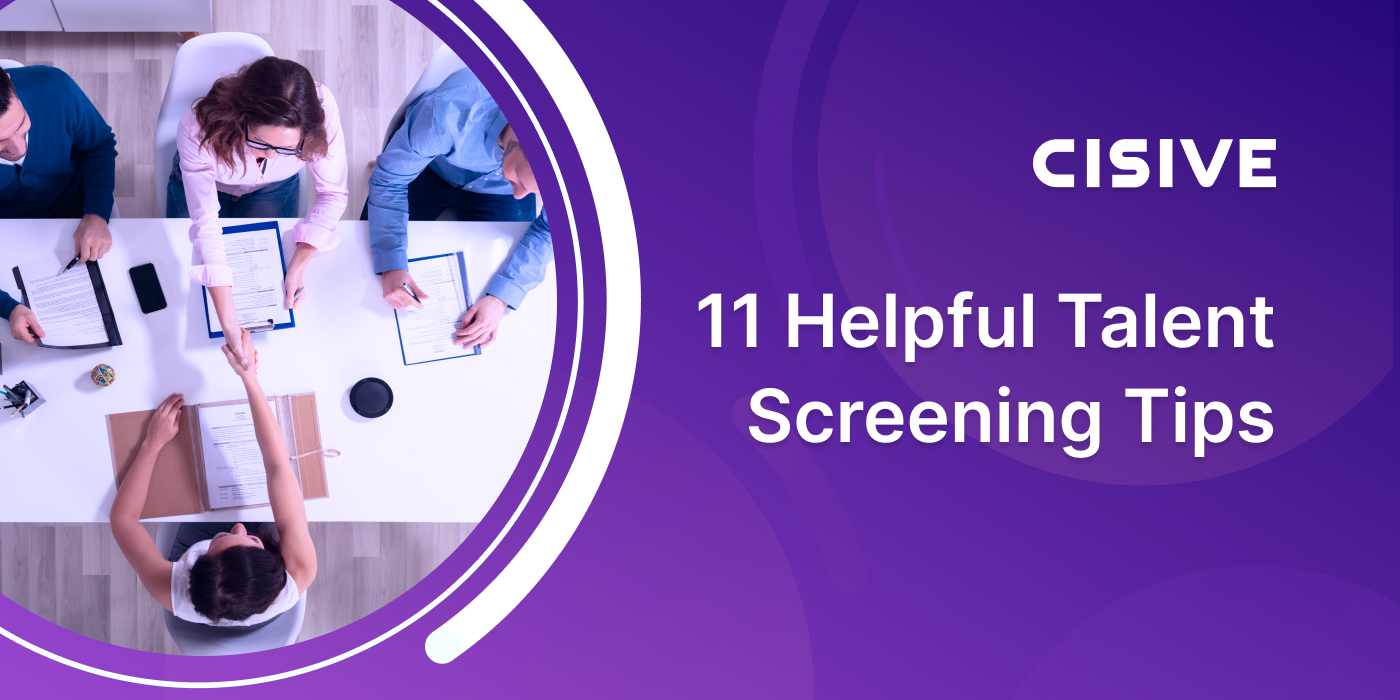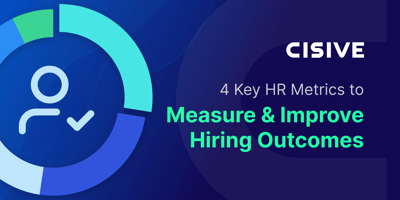

For Cisive’s most recent benchmark report, Cisive Insights: Talent Screening Trends 2021, Cisive...

You have to find the perfect candidate for an important position in your company. But you’ve never created a talent screening process to handle a wide-scale job search.
Sadly, you waste valuable time and resources interviewing unqualified candidates. Even worse, you end up hiring someone who isn't a good fit for the role or your organization's culture. This mistake could lead to decreased productivity, increased turnover, and significant costs associated with rehiring and retraining.
Developing an effective talent screening process can help you avoid these pitfalls. By using the right techniques and tools, you identify top talent, which saves time and helps you attract the most promising candidates.
Below, we look at what screening is, why it’s important, and how to implement an effective screening strategy.
Key TakeawaysHere are the key things you need to know about talent screening:
|
Talent screening is the process of evaluating candidates to determine their suitability for a specific job. You use it to find the most promising applicants. Companies of all sizes rely on talent screening to simplify their hiring approach and get the best candidates.
You can use various methods for screening, such as resume reviews, phone interviews, and skill assessments. When done right, screening saves time and resources by focusing only on qualified candidates. You’ll build a strong team and improve productivity in every department of your organization.
Talent screening looks different for different companies. It can also vary based on the position you’re hiring for. Candidates for C-suite positions will go through a more thorough screening process than those for entry-level positions. Similarly, highly technical roles may require certain skills-based screening that others do not.
Utilize screening to identify the best candidates quickly. Some examples of screening include:

Talent screening helps you find the right candidates for your team. It prevents you from wasting time and resources and hiring unqualified candidates. You safeguard your company by hiring skilled people at every level who are also the right fit.
Here are some benefits of putting a proper screening process in place:
High turnover is costly and disrupts productivity. Talent screening helps you reduce turnover by putting the right people in the right positions at the right time.
You can assess a candidate's skills, personality, and fit before sending them a job offer. Screening also increases the likelihood that you’ll find employees who’ll stay with your company long-term.
A strong business reputation attracts better all-around talent. Screening helps you hire employees who represent your brand in the best light. You avoid negative publicity from bad hires or workplace incidents. By vetting candidates, you protect your company's public image and brand.
Hiring risks include legal issues, safety concerns, or low productivity. Screening helps you verify qualifications, check backgrounds, and assess skills to avoid potential problems. You reduce the chance of hiring someone who might harm your workforce.
The costs of searching for, hiring, and training employees can have a big impact on your budget. Screening helps you create a more efficient hiring process. You can identify the best candidates faster without taking risky shortcuts. Hiring the right people also reduces the time and money you spend on training costs.

You may face several challenges when screening talent for your organization. Some obstacles make it difficult to find the right candidates or create a more efficient process. Knowing the challenges and anticipating their consequences helps you prevent problems before they arise.
Here are some challenges you’ll face when screening candidates for a job:
You need to vet each candidate fairly and consistently, which means you’re looking at the same criteria and weighing it the same for every candidate. But this may be challenging due to a wide range of variables. Maybe your team hasn’t been fully trained on hiring practices, or maybe you’re struggling to get the same interviewer with every candidate due to scheduling issues.
Different interviewers or interview questions per candidate mean that candidates are not being treated equally. The same is true if you do more thorough vetting on only certain candidates interviewing for the same position.
This all leads to unfair hiring decisions and missed opportunities. To overcome this, you need standardized guidelines and training for everyone involved in the hiring process.
You need to follow laws and regulations to avoid legal issues during and after the hiring process. If you violate a regulation, you could face stiff penalties or a lawsuit from a disgruntled applicant or former employee.
For example, you need to ensure that your screening process doesn't discriminate based on age, gender, or race. You also need to make sure your background checks are compliant with all city, state, and federal regulations. This means you should stay updated on relevant laws and provide training for your hiring team. Implementing compliant screening practices protects your company from legal risks.
Bias affects your judgment and leads to unfair hiring decisions. The problem is that bias is difficult to identify and prevent, even if you’re the one doing the hiring. You might favor candidates who share your background or interests. Or maybe you see that two candidates both lack a specific skill, but you judge it more harshly for one candidate than the other due to other characteristics.
Unfortunately, this means you have a less diverse and less effective team. To combat bias, you need to implement objective candidate screening methods and provide bias training. Using standardized talent assessments and blind resume reviews can help.
You need to quickly identify and evaluate the best candidates. However, there may be issues keeping you from speeding up the process or eliminating needless steps. A slow screening process may cause you to lose top talent to your competitors. Or it may make you feel like you need to skip this step altogether.
To improve efficiency, use automated tools and streamlined workflows. You can then process applications faster and more accurately.
Effective talent screening is essential for finding the right candidates for your team. Improve your process with these tips that will help you identify top talent.
You need to know laws like the Fair Credit Reporting Act and Equal Employment Opportunity guidelines. Obtain written consent before conducting background checks on candidates. Stay informed about regulations to avoid legal issues and fines. Regularly review and update your screening processes to maintain compliance.
Follow trends to stay competitive and streamline your screening process. Adopt new techniques and technologies to find better candidates. Use AI-powered tools to analyze resumes more efficiently. Attend industry conferences and read relevant publications to stay informed.
Fair practices help you build a diverse and talented workforce while protecting your company from legal issues. Avoid discrimination based on age, gender, race, or other protected characteristics. Ask all candidates the same interview questions to maintain consistency. Regularly train your hiring team on fair hiring practices.
Detailed descriptions help candidates understand the role and self-select before applying. Include specific responsibilities, required skills, and desired qualifications for each position. For instance, clearly state whether a role requires occasional weekend work. Review and update all job descriptions regularly.
Consistency helps you compare candidates objectively and make better hiring decisions. It also reduces the risk of bias in your screening process.
So, use the same criteria and methods for each applicant (and for current employees when you’re conducting ongoing monitoring). Create a standardized scoring system for resume reviews and have written processes in place for every hiring step.
Clear roles prevent duplication of efforts and make your evaluations more thorough. Determine who handles resume screening, interviews, and reference checks. Designate one person to coordinate all candidate communications. Create a written guide outlining each team member's responsibilities.
Planned questions help you assess candidates more consistently. They keep interviews focused and efficient. Create a list of role-specific and behavioral questions. Ask about a candidate's experience with specific software used in the role.
Assessments help you verify skills mentioned in resumes and cover letters. They also give candidates a chance to showcase their abilities. You might use coding tests for software developers or writing samples for content creators. Give candidates a sample project to complete before the interview.
Good communication shows respect for candidates and keeps their interest in the position. Provide updates on the hiring process and timeline. Send an email confirming receipt of an application within 24 hours. Set up an automated system for routine updates.
Reference checks help you make more informed hiring decisions by making sure the information provided by candidates is accurate. Contact former employers or colleagues to verify information and gather additional details. Prepare a standard set of questions for reference checks.
Automation reduces manual work and improves efficiency in screening. It also helps you manage a large volume of applications more effectively. You can use applicant tracking systems to manage resumes and schedule interviews automatically. You can also research different software options to find the best fit for your needs.
Cisive’s comprehensive background check services are designed to help you make informed hiring decisions and improve your candidate screening process. Using our tools, you onboard the highest quality candidates while maintaining a safe workplace.
Our background screening platform provides a 99.9994% accuracy rate for criminal searches. You can trust the information we provide about your potential hires. We also help you navigate complex regulatory and compliance challenges.
Here are some specific tools you can use to fine-tune your talent screening strategy:
We offer international background checks for candidates from around the world. You’ll get comprehensive information, no matter where your candidate is from. Our fingerprinting services also provide an additional layer of security so you can verify a candidate's identity and criminal history more accurately.
When you implement a talent screening process, you protect your company from security issues, legal problems, and work disruptions. Cisive’s background screening tools help you automate your processes and procure accurate information on each application. You can screen with ease.
Contact Cisive to learn more about our talent screening products and services. Start a demo or book a consultation with a Cisive expert.
Author: Cisive Staff
Bio: Contributed by a member of our staff with expertise in background screening for highly regulated industries.
Let's Connect on LinkedIn
For Cisive’s most recent benchmark report, Cisive Insights: Talent Screening Trends 2021, Cisive...

Global background checks are expected to be even more common in 2022 as many employers are taking...

Without data, how will you ever really know whether your efforts are working? How can you...